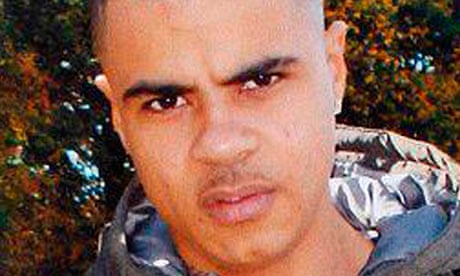A man has been formally accused of passing an illegal firearm to Mark Duggan before he was fatally shot by police.
Kevin Hutchinson-Foster, 30, appeared at Snaresbrook crown court on Friday to face a charge of "selling or transferring a prohibited firearm" to Duggan last year.
It is the first time Duggan's name has been put on Hutchinson-Foster's indictment in relation to his forthcoming trial.
Duggan's fatal shooting in Tottenham, north London, on 4 August sparked riots across the capital last summer, which spread to the rest of the country in the worst outbreak of disorder for the past 30 years.
The court heard on Friday that Hutchinson-Foster denied "selling or transferring the prohibited firearm, which had a barrel less than 30cm in length, to Mark Duggan on a day between 28 July 2011 and 5 August 2011 without the authority of the secretary of state".
He will face trial on the charge in September.
A gun, wrapped in a sock, was found approximately three to four metres (10-14ft) away from Duggan after he was killed by armed police during an attempt to intercept him led by Trident, the Met police unit that deals with gun crime in the black community.
There was no DNA on the gun but Duggan's fingerprints were found on a box that had contained it.
It is understood that police officers involved in the fatal shooting of 29-year-old Duggan are seeking to give evidence at Hutchinson-Foster's trial anonymously. Applications for some of the officers to give their evidence anonymously are in the final stages, it is understood.
The prosecution is also in the process of seeking a court order to force the BBC to hand over video material filmed in the moments when Duggan was shot and killed. The footage, filmed by a witness, was broadcast in April. It is understood the BBC will fight the production order.
Officers from the Met's Operation Trident and CO19, the firearms unit of the force, stopped a minicab carrying Duggan in Ferry Lane, close to Tottenham Hale tube station, on 4 August last year.
He was killed by a single gunshot wound to the chest, and received a second gunshot wound to his right biceps. He was pronounced dead at the scene at 6.41pm.
The inquiry by the Independent Police Complaints Commission into Duggan's fatal shooting is unlikely to be completed and published until the autumn.
An inquest into Duggan's death has also been adjourned and may never be held because sensitive information relating to intercept evidence cannot by law be disclosed to a coroner or heard in a public court.
The police watchdog has publicly expressed its frustration that the Regulation of Investigatory Powers Act 2000 allows a crown court judge and a prosecutor to view intercept evidence in private to decide how and whether to allude to it, but does not give a coroner the same power. A further decision on the inquest is likely to be made in October. This has led to problems over the inquest and questions over whether it will ever be held.
Hutchinson-Foster pleaded guilty on Friday to possession of a firearm with intent to cause fear of violence and assault causing actual bodily harm, in a separate incident.
